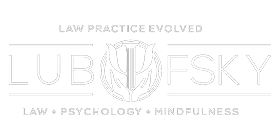A casual analysis seems to reveal a correlation between unhappiness and legal difficulties. What is confounding, of course, is whether legal problems cause people to suffer and feel unhappy, or whether unhappy people are more prone to poor decision-making that ultimately results in legal conflict. Though this correlation – to some extent – likely runs both ways, I submit that less-than-optimal decisions made by unhappy individuals driven by egoic notions of how life “should” be most often lie at the root of most legal conflict, whether civil or criminal.
The fundamental trap inheres in an unconscious identification with mind and thought as the providers of a personal identity. This “identity” is commonly understood in Western culture as the “ego.” To the extent that ego takes root as one’s personal identity or “sense of self,” one will begin to grasp, claw, protect, and react to life factors and experiences perceived as threats to the ego and (fictional) sense of self. Ultimately, it is this grasping, clinging and aversion that directly leads to a vast majority of legal conflict.
By addressing this underlying identification with the mind and thought as a sense of self in the context of resolving real-life legal issues, holistic lawyering offers the possibility of optimal solutions that can help to more meaningfully improve and even transform the lives of clients. My holistic law practice employs mindfulness training as a means of cultivating heightened awareness of present-moment experience in a way that serves to significantly loosen the grip of the ego over one’s behavior. Among the positive results of this work is a significant reduction in the likelihood of legal conflict.
To learn more about holistic lawyering and its integration of mindfulness training, contact Michael Lubofsky at (415) 508-6263 or visit our holistic lawyer site at http://www.Holistic-Lawyer.com.
